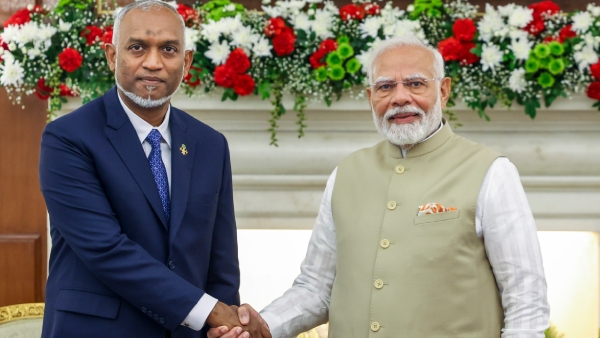The recent developments surrounding the political situation in the Maldives have sparked significant interest, particularly after a report in The Washington Post claimed that Indian intelligence had explored a plan with the Maldives Opposition to oust President Mohamed Muizzu. In response, Mohamed Nasheed, the former President of the Maldives, dismissed any suggestion of India’s involvement in regime change, stating that India has never engaged in such talks with him.
Key Takeaways:
- Alleged Plot to Impeach President Muizzu:
- The Washington Post cited a document titled ‘Democratic Renewal Initiative,’ which allegedly detailed a plot by the Maldivian Opposition to bribe 40 MPs, including members of President Muizzu’s own party, to impeach him. The report further suggested that the plotters were also attempting to secure the support of 10 senior army and police officers.
- Despite the claims, the report indicated that the plotters were unable to gather enough support for impeachment and that India neither pursued nor financed any such efforts to oust Muizzu.
- Nasheed’s Denial of Indian Involvement:
- Mohamed Nasheed, a key political figure in the Maldives with over two decades of experience with India, directly addressed the claims. Speaking to The Indian Express, Nasheed said that he did not believe India would involve itself in a regime change and confirmed that there had been no such conversations between him and India regarding this issue.
- In his statement, Nasheed highlighted that India, being the world’s largest democracy, is a country governed by law and that he had never experienced India imposing its views on other nations. Instead, India aims to strengthen the Maldives’ democratic processes, institutions, and economy, which, according to Nasheed, aligns with the interests of both countries.
Strategic Importance of the Maldives to India:
The political dynamics of the Maldives are not just a domestic concern but also hold significant strategic implications, particularly for India. Located just 70 nautical miles from India’s Minicoy Island and approximately 300 nautical miles from the Indian mainland, the Maldives’ geographic proximity gives it critical strategic importance to India, especially in terms of maritime security.
- Maritime Security: The Maldives lies at a strategic location in the Indian Ocean, acting as a crucial element in India’s maritime security framework. The commercial sea-lanes running through the Indian Ocean, including key channels like the 8° N and 1½° N, pass near the Maldives, making it a pivotal point in securing India’s interests in the region.
- Defense Ties: Estimates indicate that India plays a vital role in the defense training of the Maldivian National Defence Force (MNDF). Over 1,500 Maldivian personnel have been trained by India in the last decade. The Indian Navy has also supplied aircraft and helicopters to the MNDF, aiding in aerial surveillance and ensuring operational readiness. Furthermore, India is keen to establish a coastal radar system in the Maldives, further solidifying its role in monitoring activities in the Indian Ocean.
Conclusion:
The ongoing story surrounding India’s alleged involvement in Maldivian politics has been vigorously denied by Mohamed Nasheed, who emphasized the long-standing, cooperative relationship between India and the Maldives. While the allegations of a regime change plot remain unproven, they highlight the intricate political and security relationship between the two nations. India’s significant role in the Maldives’ defense and maritime security underscores the importance of maintaining a stable political environment in the region, which is crucial for both countries’ interests.
Also Read: Air India Introduces Wi-Fi on Select Flights: Here’s How It Works
Disclaimer
This article is for educational purposes, focusing on the relevance of the topic for UPSC aspirants. Students should stay updated on further developments and refer to official sources for comprehensive preparation.
Follow Fusion IAS

